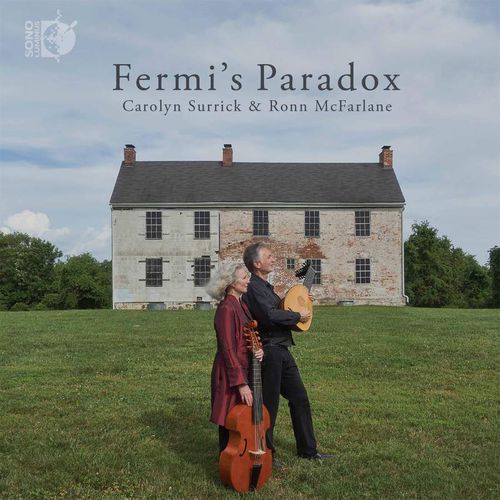Fermi's Paradox
Ronn McFarlane, Carolyn Surrick, Jackie Moran

Fermi’s Paradox
Ronn McFarlane, Carolyn Surrick, Jackie Moran
We had all the time in the world. We had three months. Our Saturday rehearsals turned into Saturdays and Sundays. Week after week we scoured our memories, stacks of books, piles of sheet music, and beloved recordings for pieces we might include on this CD.
Ronn brought tunes that have been part of his life since he was a young man - music he loves and had arranged for the lute. He arranged them again for the lute and viola da gamba. He asked, “Do you know Little Martha? It was originally recorded by the Allman Brothers.” I did not. Blackwater Side is a traditional Irish tune arranged by Bert Jansch. John Barleycorn fit perfectly with She Moved Through the Fair, an Irish tune I had never heard. It was a new song to be sung by my instrument. We both love Turlough O'Carolan and neither of us had ever recorded Planxty O'Rourke, Second Air with its mysterious blend of Irish and Italian sensibilities (tunefulness and raw emotion) so that made the short list. The Rose of Raby had been on my mind for years. This was the time and place.
It seemed ridiculous to even consider a recording for lute and gamba without something by John Dowland. It turned out just one of his compositions was for the two instruments - so we recorded it. If there’s Dowland, then there must be Marin Marais, one of the greatest composers for the viol who ever lived. If the gamba is going to sing a traditional Irish tune, why not a recitative and aria by Telemann? If she’s going to sing something by Telemann, why not an Ave Maria, written by Gounod and based on thematic material belonging to Bach?
If we loved it, the answer was, “Yes.”
As the pandemic increased in its fierce destruction, I sat alone, practicing. Some of us play from memory, some with the music in front of us. One night I began Amazing Grace. I had always played it in G major - there are lots of double stops easily available (playing more than one string at a time) and the instrument is super resonant in that key, but this time I tried C major. There was a kind of openness and freedom that had been hidden from me. I’ve played that piece for decades, but I had never heard it like that before. I sent a recording to Lindsey. I called Ronn. We had to include it.
I worked on the Bach harmonization of O Sacred Head using all the resources of the instrument - and then we added the lute. We paired another hymn, Come Thou Fount with the Swedish tune Sjungar-Lars Visa and fell in love with the two together.
Ronn and I both compose, usually inspired by people or places. His Trinity Grove and Daniel’s Chaconne are both tributes to dear friends. For me, The Last Day speaks of the weight of deep losses. And then, there’s Fermi’s Paradox. I love this story.
The brilliant Italian physicist Enrico Fermi was walking with friends at work one morning and said something like this, “It is mathematically impossible to imagine that there is not intelligent life out there in the universe.” When they were sitting in the cafeteria later that day, out of the blue, he said, “So, where are they?” All of his friends knew exactly what he was talking about.
Review
Paul Barr
Acclaimed lutenist Ronn McFarlane and violist da gamba Carolyn Surrick found themselves at loose ends in early 2020. There were no concerts or recordings in sight, and the other band members of their respective groups (Ayreheart and Ensemble Galilei) were hunkered down throughout the US. As they lived a mere 20 miles apart, Surrick suggested to McFarlane some regular musical get-togethers to see what emerged. As they shared old recordings, their archives of books and sheet music, and fond memories of their favourite songs (rock group Traffic’s 1970 rendition of English folk tune ‘John Barleycorn’ was a particular inspiration), the idea for Fermi’s Paradox began to take shape.
In Fermi’s Paradox, Surrick and McFarlane create a unique musical world. The record contains their own original works as well as new arrangements of compositions by Marin Marais, Bach, Telemann, Turlough O’Carolan and John Dowland. Some traditional Irish and Swedish tunes are also added to the mix, and Jackie Moran ably provides support on the bodhrán. After a beautiful opening with McFarlane’s own tune ‘Fermi’s Paradox’, the album moves to the centrepiece track, ‘She Moved Through the Fair’. This frequently sung piece is given a gentle viola da gamba introduction before the mood gathers pace, segueing into a rendition of ‘John Barleycorn’ that spotlights McFarlane’s increasingly powerful lute playing. The eastern themes on this track create additional depth of feeling. Another highlight on the album is the arrangement of the Allman Brothers’ acoustic guitar classic ‘Little Martha’. Surrick and McFarlane’s rendition is quite wonderful and is totally in sync with the whole feel of the album. Listeners with a fondness for classical guitar, early music and Celtic folk will enjoy this one.
Though Fermi’s Paradox is Surrick and McFarlane’s first record together, neither are strangers to musical acclaim. In 2009 McFarlane was nominated for a Grammy in the category of best classical crossover album for his record Indigo Road. Fermi’s Paradox may prove to have even greater crossover potential.
Paul Barr is a music specialist at Readings Carlton.
This item is not currently in-stock. It can be ordered online and is expected to ship in approx 4 weeks
Our stock data is updated periodically, and availability may change throughout the day for in-demand items. Please call the relevant shop for the most current stock information. Prices are subject to change without notice.
Sign in or become a Readings Member to add this title to a wishlist.


